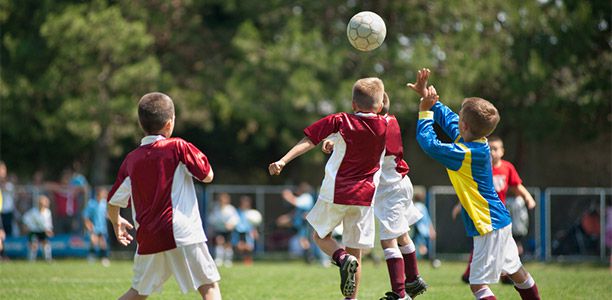A team from The University of Notre Dame Australia’s Institute for Health Research is investigating the short-term links between head trauma and depression in young football players, in the hope of developing avenues for self-reflection and education about this issue at sporting clubs.
The research project is being led by PhD candidate, Sarah Harris, with support from Notre Dame academics Associate Professor Fiona Farringdon, Dr Paola Chivers, Associate Professor Fleur McIntyre and Mr Ben Piggott.
Previous research indicates that players exposed to concussion exhibit changes in emotional wellbeing and cognitive function as they age. With players regularly exposed to the risk of head knocks and concussion from a young age, this issue is a serious talking point in sporting circles.
While a large proportion of research is conducted retrospectively addressing the potential long-term consequences of concussion, including mental illness, mood disorders and memory, little research has examined the impact of recent head knocks and concussions on the mental health of current players.
“A head knock is a sub-concussive trauma where the brain is still receiving a force, however the extent of damage is still largely unknown. The male brain is still developing until their mid-20s, therefore players who receive regular or repeat head traumas may be at greater risk of mental health issues and cognitive damage,” Miss Harris said.
Findings to date show 35 players reported 194 head knocks over the course of a season. Players who received one or more head knocks reported statistically significant higher levels of depressive symptoms than those who received no head knocks. These are injuries that were not diagnosed as a concussion by a club’s medical staff, therefore allowing the player to train or take part in a match the following week.
“There are recommended return to train / play guidelines for a player who has received a concussion diagnosis. However, a player who presents with a head knock at the time of the incident may later develop concussion symptoms, therefore a concussion diagnosis may be missed if they are not followed up or choose to not inform medical staff,” Miss Harris said.
Additionally, many players failed to report head injuries to medical staff exposing them to potential mental health consequences resulting from cumulative head knocks or a concussion/s throughout the playing season.
Miss Harris, who has worked within the WAFL system for the past eight years, says players’ physical and mental health should be a priority with avenues made possible for ongoing education, awareness and support.
“My concern lies with providing the greatest possible support for the player. Medical resources do not allow for every single player to be screened daily so club officials, players and parents need to be educated regarding what signs and symptoms they should be looking for, and at what point they need to seek further advice,” Miss Harris said.
Associate Professor Farringdon says players, coaches, parents and support staff can benefit from being more aware of the potential negative impact of recent head knocks on mental health, regardless of a concussion diagnosis.
“The value of these findings is primarily an educative one, especially at the semi-professional and community levels where there may be limited access to medical resources and no formal injury reporting procedures,” Associate Professor Farringdon said.
“This may lead to closer monitoring of symptoms and emotional changes in players, resulting in a supportive environment that encourages players to seek early medical assistance within or outside the club.”
(Source: The University of Notre Dame -Australia)










